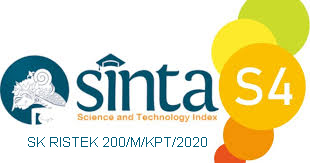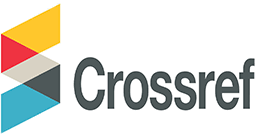Dimensional Data Design for Event Feedback Data Warehouse
Abstract
Data is an important asset and a fundamental requirement for building valuable information for organizations. Association of Information Systems Students of Unsika (Himsika) as a university organization provides many events to develop student’s academic and professional skills. A post-event evaluation through a feedback survey was conducted and stored in Google Sheets spreadsheet format. However, the current analysis process using spreadsheets lacks standardization, making it difficult to compare satisfaction rates over time and between events. Additionally, the lack of standardization leads to semi-structured data on spreadsheets, with varying question formats and meanings. To address these limitations, implementing a centralized data warehouse is proposed as a solution. The data warehouse would provide a structured and standardized approach to analyzing event feedback, enabling better comparisons and evaluation of management quality within Himsika. The research aims to design a data warehouse that supports multidimensional analysis. As a way to simplify and optimize analytical queries, the data structure is standardized in the data warehouse. The Four-step Dimensional Design method is applied in designing dimensional modeling on the data warehouse, consisting of four stages including selecting the business process, declaring the grain, identifying the dimensions, and identifying the facts. The design process resulted in 4 dimensions of events, dim_instances, dim_degree_programs, and dim_professions, and a fact table called fact_rates_by_responses. Overall, the proposed data warehouse and dimensional modeling approach aim to enhance the analysis and evaluation of Himsika’s events.
Keywords
Full Text:
PDFReferences
Agapito, G., Zucco, C., & Cannataro, M. (2020). COVID-WAREHOUSE: A Data Warehouse of Italian COVID-19, Pollution, and Climate Data. Int. J. Environ. Res. Public Health, 17, 1–22. https://doi.org/10.3390/ijerph17155596
Al-Faris, F. Z., Suharjito, Diana, & Nugroho, A. (2018). Development of Data Warehouse to Improve Services in IT Services Company. International Conference on Information Management and Technology (ICIMTech), (September), 483–488. https://doi.org/10.1109/ICIMTech.2018.8528146
Challal, Z., Bala, W., Mokeddem, H., Boukhalfa, K., Boussaid, O., & Benkhelifa, E. (2019). Document-oriented versus Column-oriented Data Storage for Social Graph Data Warehouse. 2019 Sixth International Conference on Social Networks Analysis, Management and Security (SNAMS), 242–247. https://doi.org/10.1109/SNAMS.2019.8931718
Dollah, R., & Aris, H. (2018). A Big Data Analytics Model for Household Electricity Consumption Tracking and Monitoring. 2018 IEEE Conference on Big Data and Analytics (ICBDA), 44–49. Langkawi, Malaysia: IEEE. https://doi.org/10.1109/ICBDAA.2018.8629769
Fardhani, M. R. D. (2018). Perancangan Data Warehouse Beasiswa Karya Salemba Empat dengan Nine Step Design Method (Universitas Islam Negeri Syarif Hidayatullah Jakarta). Universitas Islam Negeri Syarif Hidayatullah Jakarta. Retrieved from http://repository.uinjkt.ac.id/dspace/handle/123456789/48402
Garani, G., & Butakova, M. A. (2019). A Data Warehouse Approach for Business Intelligence. 2019 IEEE 28th International Conference on Enabling Technologies: Infrastructure for Collaborative Enterprises (WETICE), 70–75. https://doi.org/10.1109/WETICE.2019.00022
Haryono, E. M., Fahmi, Tri W, A. S., Gunawan, I., Nizar Hidayanto, A., & Rahardja, U. (2020). Comparison of the E-LT vs ETL Method in Data Warehouse Implementation: A Qualitative Study. Proceedings - 2nd International Conference on Informatics, Multimedia, Cyber, and Information System, ICIMCIS 2020, 115–120. Jakarta, Indonesia: IEEE. https://doi.org/10.1109/ICIMCIS51567.2020.9354284
Himsika. (2022). Grand Design Program Kerja Himpunan Mahasiswa Sistem Informasi Fakultas Ilmu Komputer Universitas Singaperbangsa Karawang Periode 2021-2022. Karawang: Himpunan Mahasiswa Sistem Informasi Unsika.
Iswari, L., Fudholi, D. H., & Aditya, S. K. (2019). Dashboarding the maternal and child health profiles for health supporting system. International Conference on Information Technology and Digital Applications (ICITDA 2018), 482(1), 012013. https://doi.org/10.1088/1757-899X/482/1/012013
Lapura, E. V. F., Fernandez, J. K. J., Pagatpat, M. J. K., & Dinawanao, D. D. (2018). Development of a University Financial Data Warehouse and Its Visualization Tool. Procedia Computer Science, 135, 587–595. https://doi.org/10.1016/j.procs.2018.08.229
Rahutomo, R., Putri, R. A., & Pardamean, B. (2019). Building Datawarehouse for Educational Institutions in 9 Steps. 2018 Indonesian Association for Pattern Recognition International Conference (INAPR), 128–133. https://doi.org/10.1109/INAPR.2018.8627010
Togatorop, P. (2018). Perancangan Dimensional Model Pada Data Warehouse untuk Penerimaan Mahasiswa Baru di Institut Teknologi Del. Jurnal Nasional Teknik Informatika Dan Elektro (JURNALTIO), 01(01), 53–56. Retrieved from http://jurnaltio.del.ac.id/index.php/jurnaltio/article/view/12
Turcan, G., & Peker, S. (2022). A multidimensional data warehouse design to combat the health pandemics. Journal of Data, Information and Management, 4, 371–386. https://doi.org/10.1007/s42488-022-00082-6
Vincentdo, V., Pratama, A. R., Girsang, A. S., Suwandi, R., & Andrean, Y. P. (2019). Reporting and Decision Support Using Data Warehouse for E-Commerce top-up Cell-phone Credit Transaction. 2019 7th International Conference on Cyber and IT Service Management (CITSM), 1–4. https://doi.org/10.1109/CITSM47753.2019.8965349
Wijaya, A. (2022). Data Engineering with Google Cloud Platform. Birmingham: Packt.
Yaqub, W., Kamel, I., & Aung, Z. (2020). Toward watermarking compressed data in columnar database architectures. Security and Privacy, 3(4), 1–17. https://doi.org/10.1002/spy2.84
Yulianto, A. A. (2019). Extract Transform Load (ETL) Process in Distributed Database Academic Data Warehouse. APTIKOM Journal on Computer Science and Information Technologies, 4(2), 61–68. https://doi.org/10.11591/aptikom.j.csit.36
DOI: https://doi.org/10.31326/jisa.v6i1.1648
Refbacks
- There are currently no refbacks.
Copyright (c) 2023 Ahmad Maulana Malik Fattah, Taufik Ridwan, Nina Sulistiyowati

This work is licensed under a Creative Commons Attribution-ShareAlike 4.0 International License.
JOURNAL IDENTITY
Journal Name: JISA (Jurnal Informatika dan Sains)
e-ISSN: 2614-8404, p-ISSN: 2776-3234
Publisher: Program Studi Teknik Informatika Universitas Trilogi
Publication Schedule: June and December
Language: English
APC: The Journal Charges Fees for Publishing
Indexing: EBSCO , DOAJ, Google Scholar, Arsip Relawan Jurnal Indonesia, Directory of Research Journals Indexing, Index Copernicus International, PKP Index, Science and Technology Index (SINTA, S4) , Garuda Index
OAI address: http://trilogi.ac.id/journal/ks/index.php/JISA/oai
Contact: jisa@trilogi.ac.id
Sponsored by: DOI – Digital Object Identifier Crossref, Universitas Trilogi
In Collaboration With: Indonesian Artificial Intelligent Ecosystem(IAIE), Relawan Jurnal Indonesia, Jurnal Teknologi dan Sistem Komputer (JTSiskom)
JISA (Jurnal Informatika dan Sains) is Published by Program Studi Teknik Informatika, Universitas Trilogi under Creative Commons Attribution-ShareAlike 4.0 International License.


















